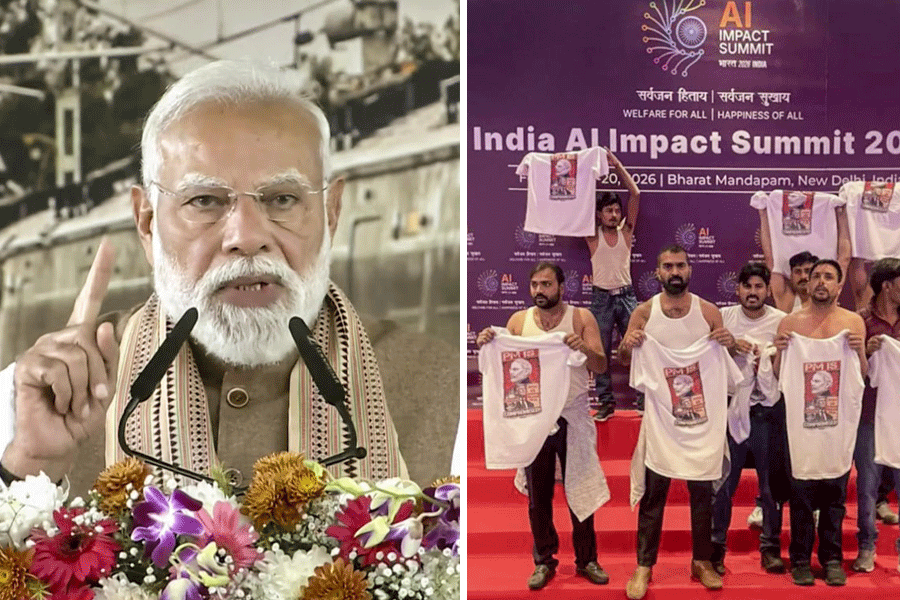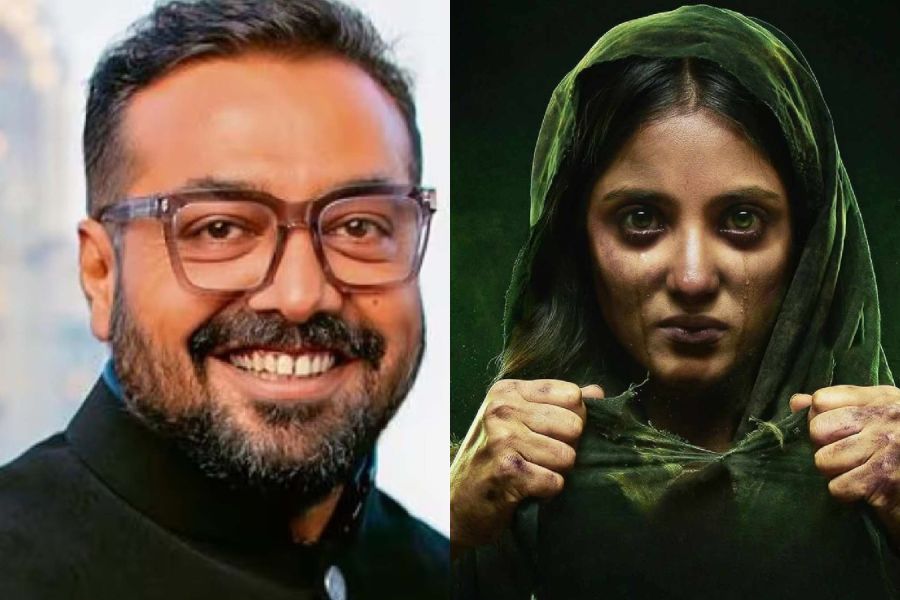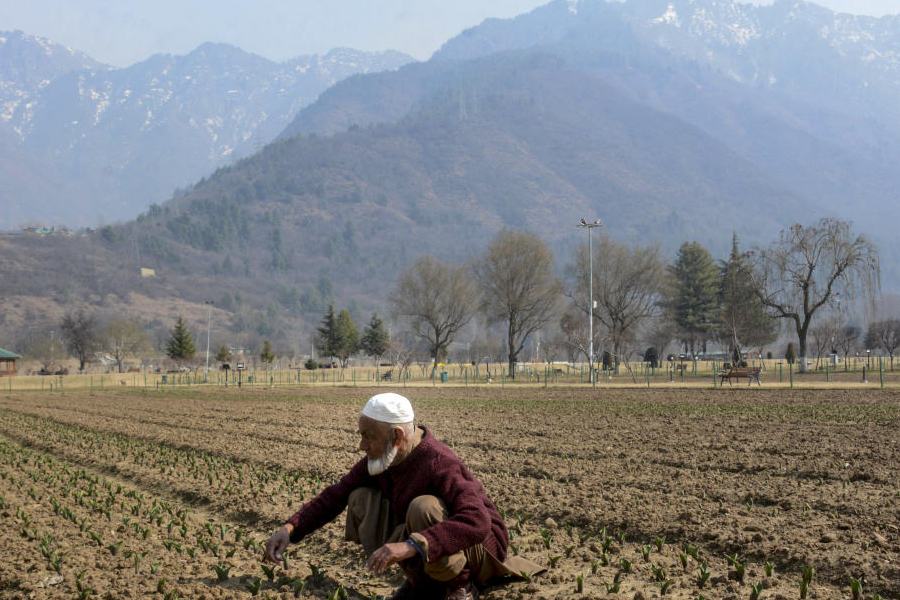Singer-composer Amit Kumar has come out with a new single titled Raat ashe, written by Sreeraj Mitra, which talks about the difficult times we are facing due to the Covid-19 pandemic, the subsequent lockdown and Cyclone Amphan that left a trail of destruction in its wake in Bengal. Launched on July 31 by Asha Audio, the track with its lyrical depth conveys the message of “going forward towards a new tomorrow” despite the difficulties. Son of the maverick genius Kishore Kumar, Amit talks to The Telegraph about life, music and his father.
How have you been during this lockdown period?
The lockdown has helped me reset myself. It’s like a new beginning. I am doing online shows now from home. Since this is what the future will look like probably, it’s a dress rehearsal.
Has it been a creative phase for you?
Before the coronavirus outbreak, I had a number of shows lined up like one on the late Sahir Ludhianvi with Dharmendraji in Ludhiana in March. But naturally things went haywire. The entertainment industry has taken a major hit. It’s a bad time for musicians.
Tell us about Raat ashe, your new song.
It’s a Bengali single that was recorded here in Gouri Kunj (the bungalow of legendary singer-actor Kishore Kumar in Mumbai). It has been tuned by Rocket Mondal, who has been working with me for close to 40 years now and it has been written by Sreeraj Mitra. It is a song of hope and speaks about the difficult times we all are facing due to the Covid-19 pandemic and the subsequent lockdown. Life has come to a standstill. Compounding to the woes was Cyclone Amphan which left Bengal devastated. The single talks about a comeback to normality. It will be released by Asha Audio.
So how was the recording done?
Initially I was hesitant because the studio at my home had been dismantled and it needed a few repairs as well. And there was no question of stepping out of home to record it. No studio was running operations then. This was around a month-and-a-half back. So we had to fall back on technology. We ran the software and I sang it here in my office after Rocket sent me the track. Thankfully, everything went well.
You carry a rich musical legacy. Tell us about the journey.
Legacy is a dangerous word. I have never thought of it as such. When I started in the early 1970s, I didn’t face too many hurdles. I didn’t have to struggle, it’s true. It was a different world back then. My journey comprised lots of highs and lows. I have worked with the best music directors of the times, delivered hits. No one did a favour just because I happened to be Kishore Kumar’s son. The Laxmikant-Pyarelal duo said, “Hum tumse gaana gawa rahe hai isliye nahi ki tu dada ka ladka hai. Tere mein kuch nahi hota toh hum kyun gawate?” And my father was not that kind of a man to ask for favours for his son. He was against it.
How easy or tough was it being Kishore Kumar’s son?
There will be comparisons but I had to compete with a giant, an absolute legend. In that context, my journey was difficult. But I took it in my stride. I have achieved the success that I deserved. R.D. Burman made me sing a few songs that he believed only I could do justice to.
Your father never received classical training as we know. What about you? Did you train in music?
It’s good that my father never trained in classical music otherwise he would have never become the legend, I believe. But see, even without a formal training he is still the most popular singer. I learnt light classical music for eight years under Pandit Satyanarayan Mishra and it paid dividends. Before that I had learnt under Ustad Ghulam Mustafa Khan saab. I had also been to Manna Dey on my father’s recommendation.
Tell us about your riyaaz now?
Let me be honest. I don’t do riyaaz now. What I am doing regularly are yoga and exercise. I do a lot of deep breathing. I meditate.
Tell us how you started out?
I used to sing my father’s songs during Durga Puja in the Calcutta paras. My first performance was in Uttam Kumar’s para (Bhowanipore). He only had asked me to sing. My mother rang up my father to complain when she came to know I was whiling away my time singing in localities. Hearing it, my father had said, “Very good, very good” (laughs). Baba flew down to see me perform at Rabindra Sadan. He was very happy and wanted me to go to Bombay then.
Your early days in Mumbai?
I loved Bombay. I lived in Calcutta but I used to travel to Bombay during vacations. Baba used to take me around, visit cinemas. It was a lot of fun. He even made a film with me (Door Gagan Ki Chhaon Mein), which was based on The Proud Rebel (1958) and Satyajit Ray’s Pather Panchali (1955).
You have worked a lot with R.D. Burman. Tell us about the experience.
I have worked on more than 170 songs with him. Our families and the Burmans went back a long way. After my father decided to move in here (Gouri Kunj), S.D. Burman was with him during the griha pravesh puja. I met Pancham Da in the early 60s, when he came to our place during rehearsals for Jaago sonewalo in Mehmood’s Bhoot Bungla. My father and Mehmood shared a great rapport from their struggling days in Bombay Talkies. When I heard R.D. Burman’s Matwali aankhon wali from Chhote Nawab, I knew this man would redefine music.
How was Kishore Kumar as a father?
He was not at all strict. He was very friendly and sweet. He was against smoking and drinking. He gave me a long rope and never forced me to do anything. He was concerned about my voice though.
Your birthday was on July 3. What did you gift yourself?
I launched my company — the Kumar Brothers Music channel on YouTube.
Any regrets?
No regrets in my life. I just want to say to everyone, ‘Don’t hurt any artiste. Don’t hit below the belt. Don’t degrade anyone. Please don’t compare me to my father. I am his son but I have my own style.










